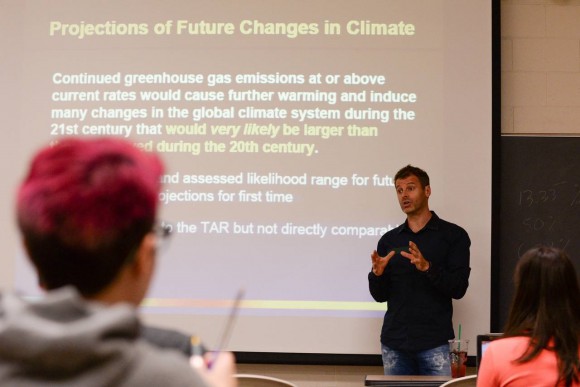
Prof. Ben Horton teaching a Byrne Seminar, a one-credit course designed to introduce first-year students at Rutgers-New Brunswick to academic life.
Benjamin Horton, professor in the Department of Marine and Coastal Sciences, was named the winner of the Plinius Medal by the European Geosciences Union (EGU). The award, which honors scientists for their important contributions to the Earth, planetary and space sciences, will be presented at the EGU 2016 General Assembly to be held in Vienna in April.
Horton’s research concerns sea-level change. He aims to understand and integrate the external and internal mechanisms that have determined sea-level changes in the past, and which will shape such changes in the future.
“It’s such a big moment for me,” said Horton. “As an American scientist, to be recognized by the European Geosciences Union is a great honor.”
“For me, this European Geosciences Union medal ultimately recognizes the students, colleagues and mentors who have always been supportive of me, both professionally and personally, throughout my career, said Horton. “But I would not have received this award if I had not had the support of my family who remind me every day of what matters in life,” he added.
Since 2012, the Plinius medal, which was established by the EGU Natural Hazards Division, recognizes interdisciplinary research in natural hazards by mid-career scientists who meet the criteria of “outstanding research achievements in fields related to natural hazards, important interdisciplinary activity in two or more fields related with this topic, and research that has been applied in the mitigation of risks from natural hazards.”
It is named for Gaius Plinius Secundus, an Italian scientist (~23 – 79 A.D.) whose main scientific legacy consists of 37 volumes of the work, “Naturalis Historia” (Natural History).
According to its website, EGU is “dedicated to the pursuit of excellence in the geosciences, and the planetary and space sciences for the benefit of humanity.”


